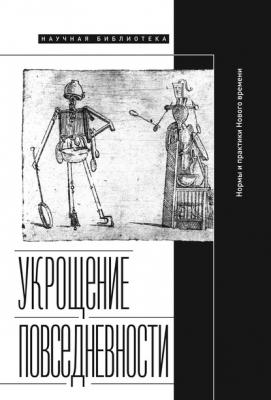ТОП просматриваемых книг сайта:
Укрощение повседневности: нормы и практики Нового времени. Коллектив авторов
Читать онлайн.Название Укрощение повседневности: нормы и практики Нового времени
Год выпуска 2020
isbn 9785444814314
Автор произведения Коллектив авторов
Жанр Культурология
Серия Научная библиотека
Издательство НЛО
8
См.: Chartier R., Vigarello G. Les trajectoires du sport: pratiques et spectacles // Le Débat. 1982. Vol. 19. P. 35–47; Sport and Leisure in the Civilizing Process. Critique and Counter-Critique / Ed. by E. Dunning and С. Rojek. London, 1992; Dunning E. Approche figurationelle du sport moderne: réflexions sur le sport, la violence et la civilisation // Norbert Elias et le XXe siècle. P. 361–388.
9
См.: Kumar K. Historical Sociology // The New Blackwell Companion to Social Theory / Ed. by B. S. Turner. Oxford, 2009. P. 391–408.
10
См.: Kocka J. «Über den Prozess der Zivilisation». Norbert Elias als Historiker // Konflikt und Reform. Fest schrift für Helmut Berding. Winfried Speitkamp und Hans-Peter Ulimann (Hrsg.). Göttingen, 1995. S. 329–337; Schwerhoff G. Zivilisationsprozeß und Geschichtswissenschaft: Norbert Elias’ Forschungsparadigma in historischer Sicht // Historische Zeitschrift. 1998. Bd. 266. S. 561–605 (здесь же см. библиографию); Chartier R. Pour un usage libre et respectueux de Norbert Elias // Norbert Elias et le XXe siècle. P. 71–104 (впервые в 2010 г.); и др.
11
См.: Breuer S. Gesellschaft der Individuen, Gesellschaft der Organisationen. Norbert Elias und Max Weber im Vergleich // Norbert Elias und die Menschenwissenschaften. Studien zur Entstehung und Wirkungsgeschichte seines Werkes / K.-S. Rehberg (Hrsg.). Frankfurt am Main, 1996. S. 303–330; Turner B. S. Weber and Elias on religion and violence // The Sociology of Norbert Elias / Ed. by S. Loyal and S. Quilley. Cambridge, 2004. P. 245–264; и др.
12
См.: Burke P. Civilisation, Discipline, Disorder: Three Case-Studies in History and Social Theory // The Postmodern Challenge: Perspectives East and West / Ed. by B. Strath and N. Witoszek. Amsterdam, 1999. P. 97–115; Smith D. The Civilising Process and the History of Sexuality: Comparing Norbert Elias and Michel Foucault // Theory and Society. Renewal and critique in social theory. 1999. Vol. 28. P. 79–100; Id. The Prisoner and the Fisherman: A Comparison between Michel Foucault and Norbert Elias // Zivilisationstheorie in der Bilanz. Beiträge zum 100. Geburtstag von Norbert Elias / A. Treibel, R. Blomert, H. Kuzmics (Hrsg.). Wiesbaden, 2000. S. 143–163; Spierenburg P. Punishment, Power and History: Foucault and Elias // Social Science History. 2004. Vol. 28. P. 607–636; Memmi D. Civilizing «Life Itself»: Elias and Foucault // Norbert Elias and Empirical Research / Ed. by T. Savoia Landini and F. Dépelteau. New York, 2014. P. 111–123; Chartier R. Au bord de la falaise. L’histoire entre certitudes et inquiétudes. Nouv. éd. Paris, 2009. P. 290–292; и др.
13
См.: Smith D. Norbert Elias and Modern Social Theory. London, 2001. P. 71–92.
14
См.: Ibid. P. 43–70.
15
См., например: Déchaux J.-H. N. Elias et P. Bourdieu: analyse conceptuelle comparée // European Journal of Sociology. 1993. Vol. 34. P. 364–385. См. также замечания о связи между идеями Элиаса и Бурдьё в статье: Chartier R. Pour un usage libre et respectueux de Norbert Elias.
16
Kilminster R. Norbert Elias and Karl Mannheim: Closeness and Distance // Theory, Culture & Society. 1993. Vol. 10. P. 81–114.
17
См.: Bert J.-F. Éléments pour une histoire de la notion de la civilisation. La contribution de Norbert Elias // Norbert Elias et le XXe siècle. P. 141–162.
18
Smith D. Norbert Elias and Modern Social Theory. P. 114–133.
19
См.: Blok A. Wittgenstein en Elias: Een methodische richtlijn voor de anthropologie. Assen, 1975.
20
См.: Scheff T. J. Elias, Freud and Goffman: Shame as the Master Emotion // The Sociology of Norbert Elias. P. 229–242.
21
См.: Schöttker D. Norbert Elias und Walter Benjamin. Ein Briefwechsel und sein Zusammenhang // Norbert Elias und die Menschenwissenschaften. Studien zur Entstehung und Wirkungsgeschichte seines Werkes / K.-S. Rehberg (Hrsg.). Frankfurt am Main, 1996. S. 40–58.
22
См, например: Joly M. Devenir Norbert Elias. Histoire croisée d’ un processus de reconnaissance scientifique: la réception française. Paris, 2012; Id. Dynamique de champ et «événements». Le projet intellectuel de Norbert Elias (1930–1945) // Norbert Elias et le XXe siècle. P. 163–200.
23
См., например, материалы сборников статей: Norbert Elias and Empirical Research; Norbert Elias et le XXe siècle; и др.
24
См., например, суммирующее суждение П. Бёрка о значении работ Элиаса в контексте современной культурной истории: «Можно обобщить реакцию культуральных историков на идеи Элиаса, сказав, что она зачастую была критической по отношению к его интерпретации истории, но его социальную и культуральную теорию находят вполне достойной того, чтобы ее использовать» (Бёрк П. Что такое культуральная история? М., 2015. С. 88).
25
Duindam J. Myths of Power. Norbert Elias and the Early Modern European Court. Amsterdam, 1995. См. также: Royal Courts in Dynastic States and Empires. A Global Perspective /

